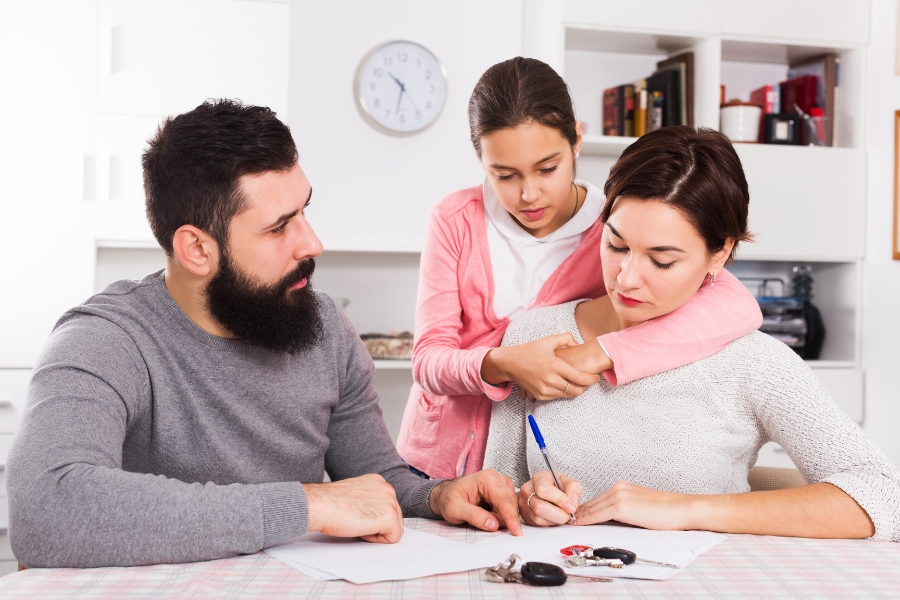
Understanding the Emotional Benefits of Divorce Mediation
No matter how you look at it, going through a divorce is always emotionally tough.
Among other difficult-to-deal-with emotions, it tends to inspire confusion, anger, and considerable stress.
These feelings are all too common for those who are going through a divorce, but the good news is they don't have to dominate your divorce.
That being said, if you want to avoid this kind of stress and trauma, you should consider choosing divorce mediation instead of battling things out in the courtroom.
Divorce mediation offers a practical, solution-focused method for handling your divorce, which can reduce stress, help you manage emotions, and keep your family life stable during this difficult time.
Unlike traditional divorce, mediation puts control back into the hands of both you and your former spouse, as you work with a neutral mediator, or mediators, to reach agreements on important issues, which helps you to avoid the bitterness and hostility often seen in court battles.
What’s more, the emotional benefits of divorce mediation are substantial.
For one thing, mediation can protect your privacy and dignity, and lower your anxiety, because you aren't fighting publicly in a courtroom, and you won't need to expose your personal life to strangers or endure harsh questioning from opposing lawyers.
Mediation also supports emotional healing because when you and your spouse commit to working together, you reduce tension and frustration, decisions become clearer, and outcomes feel fairer, as you have control of the outcome, which helps you move forward instead of feeling stuck in resentment or anger.
Imagine ending your marriage with less stress, less anger, and clearer communication.
How would that change your emotional health? How would it improve your children's experience?
With those questions in mind, this article explores the powerful benefits of divorce mediation, and how they can help with reducing conflict in divorce, reducing divorce trauma, and coping with divorce stress.
So, if you want to know how to protect your emotional and mental health during divorce, keep reading to learn how divorce mediation can help.
What Are the Emotional Benefits of Divorce Mediation?

Divorce mediation offers several emotional benefits, all of which can help you heal from the stress and trauma associated with ending your marriage.
And understanding these benefits can help you decide if mediation is the right path for you, your former spouse, and your family.
So, let’s explore the emotional benefits of divorce mediation and look at how these advantages can make your divorce process more constructive and less emotionally draining.
Reduced Conflict and Increased Cooperation
One of the key benefits of divorce mediation is reduced conflict between divorcing partners.
Traditional divorce proceedings often position partners as adversaries, as each partner has their own attorney and is fighting to "win" against the other.
This competitive dynamic often leads to anger, resentment, and hostility.
Divorce mediation, on the other hand, changes that narrative because instead of seeing each other as opponents, you’ll feel more like collaborators.
Both you and your ex will work together, guided by a neutral mediator, or mediators, to reach mutually acceptable agreements, ensuring the discussion stays constructive and solution-oriented, while focusing on fairness and practicality.
In any case, when conflict decreases, emotional healing becomes easier.
Imagine a couple whose relationship became volatile and filled with arguments toward the end.
During mediation, they’ll learn to communicate more respectfully and clearly, and be encouraged to make practical decisions about their home, finances, and children without heated debates and personal attacks that are not productive.
As a result, both you and your former spouse will feel calmer and less anxious, experiencing less emotional damage than you would if you went to court.
Enhanced Emotional Stability
Another key benefit of divorce mediation is emotional stability.
Divorce is often characterized by uncertainty and unpredictability, which tends to intensify feelings of stress and anxiety.
But the mediation process provides structure, control, and predictability, helping to ease feelings of anxiety and instability.
In mediation, you control the outcome directly, and although the mediator acts as a guide, the decisions are made based on the negotiations between you and your former partner.
This is incredibly important because when you feel that you’re in control, your anxiety and stress levels are likely to decrease, as you won’t be left wondering how a judge will rule on things like custody or asset division.
Instead, the two of you will actively shape the agreements that affect your future.
Consider a mother who’s anxious about losing precious time with her children if she chooses to battle things out in court.
Through mediation, she can openly express her concerns, negotiate parenting schedules, and clearly communicate her children's needs.
The outcome is clear and predictable, and knowing exactly when and how she’ll see her kids can greatly reduce her anxiety and promote emotional stability.
Greater Sense of Fairness and Satisfaction
Feeling that divorce outcomes are fair is critical for emotional healing.
That being said, court rulings can sometimes leave one or both partners feeling unfairly treated, and this tends to lead to things like resentment and anger.
Divorce mediation, however, can help to increase feelings of fairness and satisfaction, as it encourages balanced agreements.
Both partners voice concerns and priorities equally, and mediators help to keep the dialogue open, ensuring each party is heard and understood.
And because the decisions result from mutual compromise, both you and your former partner can walk away feeling fairly treated.
What’s more, there’s evidence to show that divorcing couples who reach agreements like this are less likely to ever end up going to court.
At any rate, instead of the court dividing your property in ways that may run counter to your interests, values and goals, mediation allows you to weigh the emotional and practical value of your combined assets together.
And when you both feel that you got a fair deal, this will reduce any bitterness or resentment and allow for emotional healing to begin.
Improved Communication Skills
Improving communication is another critical emotional benefit of divorce mediation, not least because divorce typically occurs when communication breaks down entirely.
With that in mind, mediation provides a structured setting to rebuild healthy dialogue and improve communication skills, which can be beneficial long after your divorce papers are signed.
Mediation encourages clear, respectful, and solution-focused discussions, as mediators guide partners to speak respectfully, actively listen, and acknowledge each other's viewpoints.
And these communication skills can help divorced individuals to co-parent more effectively, which makes life after divorce much less emotionally draining.
For instance, when it comes to custody issues, instead of clinging to personal grievances, mediation encourages you to let that stuff go and focus strictly on the welfare of your children, as you learn how to transition from a romantic relationship to a co-parenting relationship.
In any case, this kind of improved communication results in fewer misunderstandings, less anger, and more peaceful interactions, leading to healthier post-divorce family dynamics.
Protection of Children’s Emotional Health

Protecting children's emotional well-being is another benefit of divorce mediation.
Court proceedings can be intense emotional battles, and children easily pick up on parental tension and anxiety, which can profoundly affect their emotional stability and mental health.
In contrast, mediation actively seeks to minimize children's emotional stress, as mediators remind parents that their primary responsibility is to safeguard their children's emotional security.
Parents who choose divorce mediation work together to reach child-centric decisions, which helps to keep family life stable, despite these changes.
At any rate, taking this kind of approach helps you to ensure your children can adjust to this quickly and experience minimal emotional disruption.
Moreover, your children will learn from the example you set by prioritizing problem solving and mutual respect.
And this is incredibly important, as studies involving adults whose parents divorced demonstrate the lifelong impact divorce can have on children and their future romantic relationships.
If you’d like to learn more on this topic, you can check out our article on How to Protect Your Children’s Well-being During Divorce.
Preservation of Privacy and Dignity
The public nature of courtroom divorces can intensify emotional distress and embarrassment.
For most cases, courtrooms are open to the public and many times hearings occur with multiple cases on calendar in a crowded courtroom.
Personal, often painful details become part of the public record, which can cause significant emotional trauma.
Moreover, litigation also encourages painful attacks between divorcing spouses as they attempt to come out on top.
But divorce mediation avoids these issues by preserving your privacy, as mediation discussions remain confidential.
This helps to protect your dignity, and knowing your personal life won't be publicly aired relieves considerable emotional stress and promotes emotional recovery.
And this sense of privacy and dignity helps to facilitate emotional healing and allows for a smoother transition into life after divorce.
Faster Resolution and Closure
Drawn-out divorce battles exacerbate stress and trauma, and this often prevents emotional healing from taking place.
Having said that, another important emotional benefit of divorce mediation is speed, as mediated divorces typically conclude much faster than those that play out in a courtroom.
A swift, cooperative divorce process allows you to focus on moving forward, which helps to promote emotional closure.
You aren't stuck in emotional limbo, waiting months or even years for legal issues to resolve.
In any case, a shorter process means earlier closure, which helps you to more quickly recover emotionally.
This speed and clarity help divorcing partners to start rebuilding their lives promptly, and this can radically reduce the stress, trauma, and anxiety associated with your divorce.
Financial Clarity and Less Economic Anxiety
The financial uncertainty that tends to happen in these situations adds yet another layer of worry to the divorce process, as a court-controlled divorce will be costly, lengthy, and unpredictable.
On the other hand, divorce mediation tends to be a much less expensive process, and it provides clarity on financial arrangements sooner.
Mediators are charged with providing clients with the necessary information and guidance to reach agreements, and every minute of mediation is spent focusing on coming up with resolutions, instead of waiting for your turn on a crowded court calendar so a stranger in a black robe can impose decisions you may not want.
And knowing you aren't wasting money on endless legal fees helps to ease financial stress and reduce economic anxiety, all of which can help to improve your emotional health.
Empowerment and Personal Growth
Among all these other benefits, mediation also offers emotional empowerment.
Because rather than feeling victimized by your divorce, mediation empowers you to become an active decision-maker, which fosters confidence and emotional resilience.
The cooperative nature of mediation also encourages personal growth, as you develop conflict resolution, problem-solving, and communication skills that are valuable beyond your divorce.
And as you navigate the mediation process, you strengthen your ability to deal with your emotions, which helps to ensure you’re better equipped to handle future emotional challenges.
Final Words
Divorce mediation offers essential emotional benefits that are crucial for healing from the trauma and stress divorce or separation often bring.
The reduced conflict, enhanced emotional stability, sense of fairness, improved communication, protection for children, privacy, speed, financial clarity, and personal empowerment mediation offers will all help you to heal faster and rebuild a healthy emotional life after divorce.
And when your divorce becomes less stressful and traumatic, and therefore less emotionally damaging, you’ll gain the clarity and confidence you need to have healthier post-divorce relationships and greater emotional peace.
If you’d like to learn more about the Compassionate Divorce protocol, and the benefits of divorce mediation, you can read our article, Breaking Up Amicably: The Benefits of Compassionate Divorce or contact us for more information.
